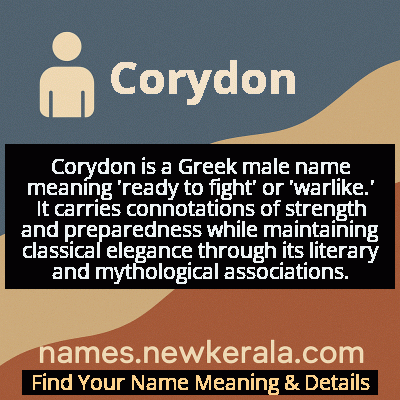Corydon Name Meaning & Details
Origin, Popularity, Numerology Analysis & Name Meaning of Corydon
Discover the origin, meaning, and cultural significance of the name CORYDON. Delve into its historical roots and explore the lasting impact it has had on communities and traditions.
Name
Corydon
Gender
Male
Origin
Greek
Lucky Number
4
Meaning of the Name - Corydon
Corydon is a Greek male name meaning 'ready to fight' or 'warlike.' It carries connotations of strength and preparedness while maintaining classical elegance through its literary and mythological associations.
Corydon - Complete Numerology Analysis
Your Numerology Number
Based on Pythagorean Numerology System
Ruling Planet
Uranus (Rahu)
Positive Nature
Strong sense of order, loyal, practical, and disciplined.
Negative Traits
Stubborn, overly serious, rigid, and prone to feeling restricted.
Lucky Colours
Blue, gray.
Lucky Days
Saturday.
Lucky Stones
Blue sapphire.
Harmony Numbers
1, 7, 8.
Best Suited Professions
Managers, engineers, accountants, organizers.
What People Like About You
Dependability, discipline, practicality.
Famous People Named Corydon
Corydon of Thebes
Ancient Greek poet
Minor Greek poet known for pastoral poetry and epigrams preserved in the Greek Anthology
Corydon
Literary character
Shepherd character in Virgil's Eclogues, representing pastoral innocence and same-sex love in classical literature
Corydon
Mythological figure
A Cretan who competed in funeral games and appears in various Greek mythological traditions
Corydon
Literary pseudonym
Pen name used by various Renaissance and early modern writers for pastoral poetry
Name Variations & International Equivalents
Click on blue names to explore their detailed meanings. Gray names with will be available soon.
Cultural & Historical Significance
In modern times, the name gained additional cultural weight through André Gide's 1924 dialogue 'Corydon,' which defended homosexuality and sparked significant literary and social controversy, transforming the name into a symbol of LGBTQ+ advocacy in 20th-century literature. This modern association built upon the classical foundations while adding contemporary social significance, creating a name that bridges ancient pastoral ideals with modern struggles for identity and acceptance. The cultural journey of Corydon reflects how classical names can acquire new layers of meaning across centuries while maintaining their essential character.
Extended Personality Analysis
Individuals named Corydon are often perceived as possessing a blend of classical refinement and resilient strength. The name's etymological meaning 'ready to fight' suggests someone with determination, courage, and the ability to stand up for their beliefs, while its literary associations with pastoral poetry indicate artistic sensitivity and emotional depth. This combination creates a personality profile of someone who is both intellectually sophisticated and practically capable, able to navigate complex social situations with grace while maintaining personal integrity.
The historical and literary weight of the name often correlates with individuals who value tradition but are not afraid to challenge conventions when necessary. They tend to be thoughtful communicators with a strong sense of justice and a natural inclination toward creative expression, whether through writing, arts, or intellectual pursuits. The duality of warrior spirit and artistic sensibility makes Corydons particularly adept at balancing action with reflection, often emerging as mediators who can understand multiple perspectives while remaining committed to their core principles. This creates individuals who are both grounded in reality and capable of visionary thinking.
Modern Usage & Popularity
In contemporary times, Corydon remains a relatively uncommon but culturally significant name, primarily used by parents seeking a name with classical heritage and literary depth. Its usage peaked in the late 19th and early 20th centuries but has seen a modest revival in recent decades among families with interests in classical literature, mythology, or LGBTQ+ history. The name maintains a distinctive quality without being overly obscure, appealing to those who want a name that stands out while carrying substantial cultural weight. Current usage trends show it appearing more frequently in academic and artistic circles, and it's particularly popular in regions with strong classical education traditions. While not ranking in mainstream popularity charts, Corydon continues to be chosen by parents who appreciate its rich historical associations and the sophisticated, timeless quality it imparts.
Symbolic & Spiritual Meanings
Symbolically, Corydon represents the intersection of pastoral innocence and intellectual courage. The name carries connotations of the idealized countryside and simple virtues while simultaneously embodying the strength to defend one's beliefs and identity. It symbolizes the reconciliation of apparent opposites: the gentle shepherd and the ready warrior, the classical tradition and modern progressivism, artistic sensitivity and moral fortitude. Through its literary history, Corydon has become a symbol for speaking difficult truths with elegance and defending marginalized perspectives with dignity. The name evokes the image of someone who maintains their integrity in the face of opposition while remaining connected to beauty and tradition, representing the courage to love authentically and the wisdom to understand that true strength often lies in vulnerability and artistic expression.

